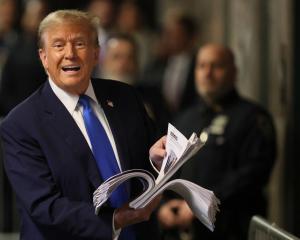"We look forward to the full development and rapid implementation of their plan," Obama said in a statement released by the White House.
"We will continue to support the EU and our European allies in their efforts to address this crisis as we work together to sustain the global recovery and put our people back to work," he said.
U.S. Secretary of State Hillary Clinton, meeting with Greek Foreign Minister Stavros Lambrinidis, said the EU deal was "critical" to resolving the continent's economic woes and hailed Greece for making sacrifices.
"While those changes and sacrifices are certainly painful, they are necessary," Clinton said.
Lambrinidis said the EU deal with private banks and insurers to slash Greece's debt burden and try to contain the two-year-old euro zone crisis was an important step in the right direction.
"Yesterday a new leaf was turned in Europe and I think a number of very hopeful days are ahead of us," Lambrinidis said.
"We know we have tough days ahead of us. We are changing our country and Europe is indicating that it doesn't only have the ability but also the will to stand by us and to stand by the European Union project," he told reporters.
The strategy unveiled after 10 hours of negotiations focused on three key points. These included a significant reduction in Greece's debts, a shoring up of the continent's banks, partially so they could sustain deeper losses on Greek bonds, and a reinforcement of a European bailout fund so it can serve as a euro1 trillion ($US1.39 trillion) firewall to prevent larger economies like Italy and Spain from being dragged into the crisis.
After several missed opportunities, hashing out a plan was a success for the 17-nation eurozone, but the strategy's effectiveness will depend on the details, which will have to be finalized in the coming weeks.
"The finer details still appear somewhat sketchy ... but the prospect of a contagion and a disorderly default appear to have been put to one side for the time being," said Michael Hewson, market analyst at CMC Markets.
"The only concern is that this post-deal euphoria could well leave investors with a nasty hangover when they start to look at the fine print and realise that this solution could well be another sticking plaster."
President Barack Obama, who had been increasingly pressuring Europe to get its act together in recent weeks, welcomed the plan - but pointedly noted that the U.S. was looking forward to its "full development and rapid implementation."
The most difficult piece of the puzzle proved to be Greece, whose debts the leaders vowed to bring down to 120 percent of its GDP by 2020. Under current conditions, they would have ballooned to 180 percent.
To achieve that massive reduction, private creditors like banks will be asked to accept 50 percent losses on the bonds they hold. The Institute of International Finance, which has been negotiating on behalf of the banks, said it was committed to working out an agreement based on that "haircut," but the challenge now will be to ensure that all private bondholders fall in line.
It said the 50 percent cut equals a contribution of euro100 billion ($US139 billion) to a second rescue for Greece, although the eurozone promised to spend some euro30 billion ($US42 billion) on guaranteeing the remaining value of the new bonds.
The full programme is expected to be finalised by early December and investors are supposed to swap their bonds in January, at which point Greece is likely to become the first euro country ever to be rated at default on its debt.
"We can claim that a new day has come for Greece, and not only for Greece but also for Europe," said Greek Prime Minister George Papandreou, whose country's troubles touched off the crisis two years ago. "A burden from the past has gone, so that we can start a new era of development."
Not all Greeks were convinced. Prominent left-wing deputy Dimitris Papadimoulis said the agreement would doom Greeks to a deeper recession.
"The deal puts Greece in a eurozone quarantine," he said. "We are now locked in a system of continuous austerity, haphazard privatisation, and continuous supervision by our creditors."
He also noted an inherent conflict of interest in the plan.
"Those who monitor us do not have our interests in mind. Their priority is that we pay back our loans," Papadimoulis said.












